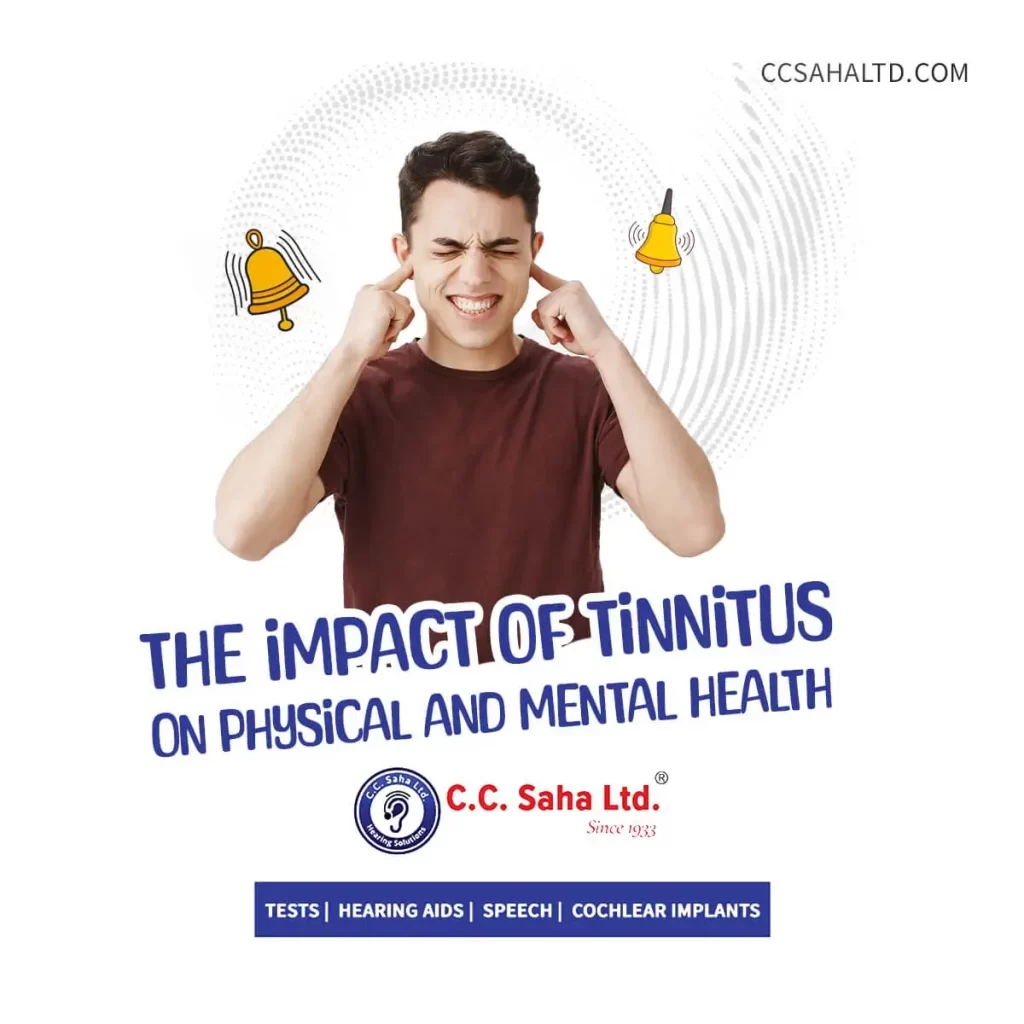
Paediatric Hearing Care
Early intervention is the key to paediatric hearing care. Learn how CC Saha Ltd. combines audiology, speech therapy, and occupational therapy for success.
Arindam Paul, a middle-aged engineer, works in an automobile assembly plant, surrounded by the relentless clamour to the operation of large machinery and assembling processes. The constant barrage of loud noises has taken a toll on his hearing health and has a persistent ringing in his ears. Arindam’s struggle is not just about enduring an annoying sound; it’s about managing the profound effects that this constant ringing sound has on his physical and mental health.
At work, the noise exacerbates his condition, making it difficult for him to concentrate on his tasks. The ringing in his ears is so intense that it often leads to headaches, adding to the physical strain of his demanding job. Despite using ear protection, the relentless noise of the plant seeps through, making each day a battle against fatigue and frustration.
This ringing sound in the ear is called tinnitus. The impact of tinnitus on Arindam’s life extends beyond the factory floor. At home, the ringing in his ears made it challenging to relax and unwind. His sleep is frequently disrupted, leaving him exhausted and irritable. The lack of restful sleep has weakened his immune system, making him more prone to illnesses.
Mentally, Arindam felt the weight of his condition. The constant noise in his head has led to increased anxiety and bouts of depression. He found it difficult to engage in conversations and often felt isolated, even in the company of his loved ones. Social gatherings, once a source of joy, have become overwhelming due to the struggle to hear clearly amidst the background noise.
Arindam’s story highlights the significant impact tinnitus can have on one’s physical and mental well-being. It underscores the importance of addressing this condition with effective management strategies and seeking professional support to improve the quality of life for those affected.

26.1% of people with tinnitus reported anxiety issues versus 9.2% of those without tinnitus. 25.6% of people with tinnitus reported depression issues versus 9.1% of those without tinnitus.
Tinnitus (pronounced tih-NITE-us or TIN-uh-tus) is the perception of sound that does not have an external source, so others cannot hear it. It is commonly described as a ringing sound, but some people hear other types of sounds, such as roaring or buzzing.
Surveys estimate that 10 to 25% of adults have tinnitus, and children can also experience it. Tinnitus may improve or even go away over time, but in some cases, it worsens. When tinnitus lasts for three months or longer, it is considered chronic.
The causes of tinnitus are unclear, but most people who have it also have some degree of hearing loss. Tinnitus is rarely associated with a serious medical problem and is usually not severe enough to interfere with daily life.
However, some people find that it affects their mood and their ability to sleep or concentrate. In severe cases, tinnitus can lead to anxiety or depression. Currently, there is no cure for tinnitus, but there are ways to reduce symptoms. Common approaches include the use of sound therapy devices (including hearing aids), behavioral therapies, and medications.
The main cause of tinnitus is not fully understood by experts. However, tinnitus is commonly associated with certain medical conditions. Some common causes of tinnitus include:
As people age, they may experience a decrease in hearing ability, leading to the perception of sounds that are not actually present. Approximately 1 in 3 adults over the age of 65 develop ringing in their ears.
Exposure to loud noises, whether from a single incident or over time, can lead to hearing loss and tinnitus.
Physical injuries to the ear can affect nerves or brain areas associated with hearing. This can result in tinnitus, typically affecting only one ear.
Conditions such as earwax blockages or ear infections can cause temporary hearing loss, leading to the perception of ringing in the ears.
Certain medications, including some antibiotics, antidepressants, cancer drugs, and nonsteroidal anti-inflammatory drugs (NSAIDs), can cause tinnitus.
As people age, they may experience a decrease in hearing ability, leading to the perception of sounds that are not actually present. Approximately 1 in 3 adults over the age of 65 develop ringing in their ears.
Less common risk factors for tinnitus include, Eustachian tube dysfunction, Ménière’s disease, Temporomandibular joint (TMJ) disorders, Vestibular Schwannoma, Otosclerosis, blood vessel disorders, and autoimmune diseases such as lupus or rheumatoid arthritis.
People with tinnitus may experience flare-ups after exposure to certain triggers such as stress or sleep deprivation, creating a frustrating cycle.
One of the most common physical impacts of tinnitus is difficulty sleeping. For Arindam, the constant ringing in his ears often kept him awake at night, making it hard to get a good night’s sleep.
This lack of sleep not only made him feel tired and irritable during the day but also affected his overall health. This chronic sleep deprivation can weaken the immune system, making it easier for him to get sick and harder for his body to recover from illnesses.
Tinnitus is often linked to hearing loss, which can further complicated Arindam’s life. The persistent noise can made it difficult for him to hear other sounds clearly, particularly in a noisy environment like the assembly plant.
This hearing loss hindered his ability to communicate with his colleagues, leading to a few misunderstandings and mistakes at work. Over time, this affected his job performance and overall productivity.
In some cases, the constant ringing in the ears also triggers headaches or migraines. The stress and frustration caused by the relentless noise can lead to tension headaches, which can be painful and debilitating.
In more severe cases, these headaches can develop into migraines, which can be even more challenging to manage and may require medication or other treatments.
The physical strain of dealing with tinnitus can lead to increased stress and fatigue. Like Arindam often felt exhausted from trying to cope with the constant noise in his head.
This ongoing fatigue among people suffering from tinnitus can make it difficult for them to stay focused and energized throughout the day, impacting their performance at work and their ability to enjoy their personal lives.
There is also evidence suggesting that tinnitus may be linked to cardiovascular problems. The stress and anxiety caused by the condition can lead to increased blood pressure and heart rate, which can strain the cardiovascular system.
For someone like Arindam, who already faces physical demands at work, this added strain can increase the risk of developing heart-related issues over time.
The role of family and friends is very important for ones with severe hearing loss. Familial support is key for them to stop feeling isolated and lonely. Through understanding, patience, and regular efforts in communication, loved ones can significantly enhance the well-being of those affected. Encouraging open and honest dialogue about the challenges associated with hearing loss can create a more inclusive and supportive environment, fostering stronger emotional bonds and mutual understanding.
Tinnitus can make it hard to concentrate, affecting your ability to work or enjoy hobbies. The constant distraction can lead to decreased productivity and frustration. Over time, this can impact your self-esteem and overall quality of life.
The challenges in communication and the embarrassment or frustration caused by tinnitus can lead to social withdrawal. You might find yourself avoiding social situations, which can further contribute to feelings of loneliness and isolation.
Understanding these physical and mental health impacts is crucial for managing tinnitus effectively. By recognizing how tinnitus can affect physical and mental health, individuals can take proactive steps to mitigate these effects, seek appropriate medical care, and improve their overall well-being.
Using background noise to mask the sound of tinnitus can be helpful. White noise machines, fans, or soft music can provide relief, especially at night. These background noises can help divert your attention from the tinnitus sounds and make them less noticeable.
Stress can exacerbate tinnitus symptoms. Techniques like yoga, meditation, and deep breathing can help reduce stress levels, making the condition more manageable. These relaxation techniques can also improve your overall well-being, which may have a positive impact on tinnitus.
If tinnitus is accompanied by hearing loss, hearing aids might be beneficial. They can amplify external sounds, making the tinnitus less noticeable. Hearing aids can also improve your ability to hear external sounds, which can help distract from the tinnitus.
Don’t hesitate to seek help from healthcare professionals. Audiologists, and counsellors at CC Saha Hearing Clinics can help you with valuable advice and coping strategies. These highly experienced professionals can provide personalized guidance and support to help you better manage your tinnitus and improve your quality of life.
Tinnitus is more than just an annoying sound; it can significantly impact both physical and mental health. Understanding these effects is the first step in managing the condition. By exploring different management strategies and seeking professional support, you can improve your quality of life despite tinnitus. Remember, you’re not alone, and help is available.
At C.C. Saha Ltd., we provide a comprehensive range of hearing solutions that include the testing of a patient’s ability to detect tones at different frequencies. Our highly skilled Audiologists conduct a thorough examination, taking into account the patient’s hearing loss history, lifestyle choices, and needs, and then recommend the best possible hearing solution.
We are present across the city of Kolkata, at Esplanade, Prince Anwar Shah Road, Dunlop, Salt Lake, and Barasat. We also have clinics at Midnapore and Burdwan.

Early intervention is the key to paediatric hearing care. Learn how CC Saha Ltd. combines audiology, speech therapy, and occupational therapy for success.

As we welcome 2026, it is time to prioritize ear health. Explore our guide on making impactful hearing resolutions for the New Year, from annual testing to upgrading your devices.

At CC Saha Ltd., excellence in hearing care meets a legacy of compassion and expertise. As the best hearing aid centre in Kolkata since 1933, the brand continues to make hearing comfortable, easy, and life-changing for every generation.

CC Saha Ltd delivers the best cochlear implants in Kolkata and Eastern India, specializing in various types and guiding patients through every stage of the cochlear implant journey.

Early detection of hearing loss can define a child’s ability to communicate, learn, and connect with the world. Paediatric hearing tests are designed to identify hearing challenges at the earliest stages, often before a parent even notices a concern. From new-born OAE and ABR screenings to playful conditioned audiometry in toddlers, these specialized tests ensure accurate results in a child-friendly way.

The benefits of hearing aids go far beyond better hearing—they transform lives by improving communication, emotional health, and cognitive vitality. From reconnecting with loved ones to regaining confidence in social and professional settings, hearing aids restore the joy of sound in every moment. With advanced technology that adapts to individual environments, they offer clarity, comfort, and control. Discover how embracing modern hearing solutions through CC Saha Ltd. can help you experience the life-changing benefits of hearing aids today.
#Impactotinnitus #mentalhealth #physicalhealth #hearingloss #hearingaids #hearing #audiology #hearingaid #audiologist #hearinglossawareness #hearinghealth #hearingtest #tinnitus #hearingimpaired #cochlearimplant #ears #deafculture #health #hearinglosswontstopme #deafcommunity # #deafeducation #CCsaha #CCshaltd #ccsaha1933 #hearingclinic #hearingsolution

